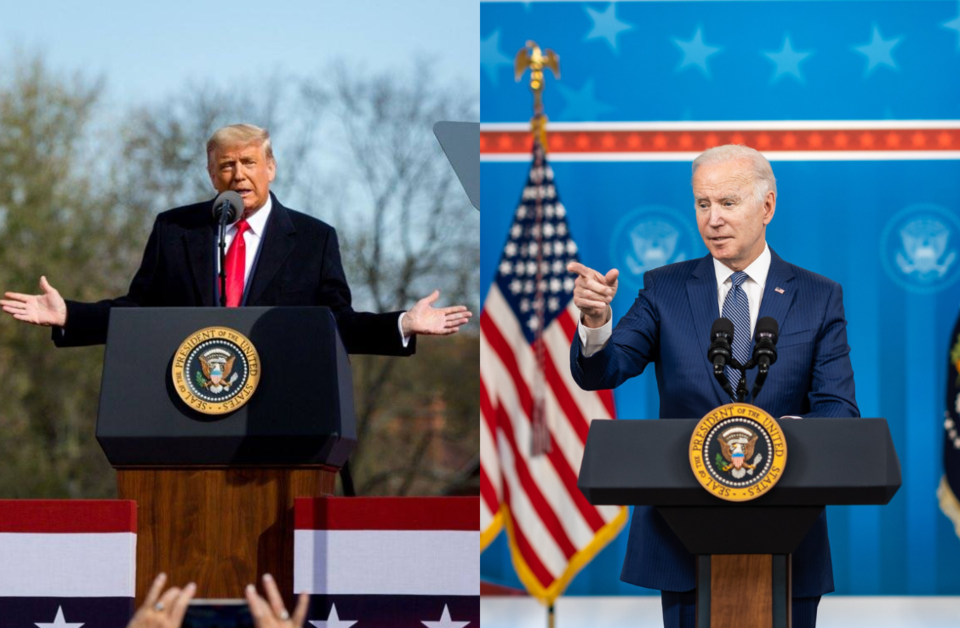In the summer of 2020, 73 per cent of Canadians told Research Co. and Glacier Media that the presidency of Donald Trump in the United States had been “very bad” or “bad” for Canada.
At the time, the COVID-19 pandemic was in the minds of most of us. Having little opportunity to go outside, on account of lockdowns and “work from home” directives, Canadians were exposed to coverage of American politics at a level they never had experienced before.
In that same survey, 44 per cent of Canadians thought Joe Biden would be a “very good” or “good” president for Canada. Reaction to the then-Democratic nominee was lukewarm, but clearly superior to the numbers posted by the Republican incumbent.
In less than six months, American voters will once again choose which one of these two men deserves another term at the White House. We recently asked Canadians about their views on the two de facto presidential nominees.
Perceptions of Trump’s tenure remain negative, but are not as terrible as they were in 2020. Almost three in five Canadians (59 per cent) think his time as president from January 2017 to January 2021 was “very bad” or “bad” for Canada (down 14 points).
Just under three in ten (29 per cent, up 12 points) believe Trump’s presidency was “very good” or “good” for Canada.
Our collective views on Biden are slightly better than they were in 2020, but are nowhere near representing a massive embrace of the current president. Almost half of Canadians (48 per cent) think Biden’s tenure has been “very good” or “good” for Canada, up four points from what Canadians imagined in 2020.
There is a significant gender gap in the assessment of one of the American presidential candidates.
A third of men (33 per cent) say Trump’s time in Washington was good for Canada, but only 25 per cent of women feel the same way.
Biden’s positive rating is roughly the same among men (49 per cent) and women (47 per cent).
Majorities of Canadians who reside in Quebec (57 per cent) and British Columbia (52 per cent) think highly of Biden’s term. The proportions are lower among those who live in
Atlantic Canada (49 per cent), Ontario (45 per cent), Saskatchewan and Manitoba (44 per cent) and Alberta (32 per cent).
Trump gets his best rating in Alberta (33 per cent) and Saskatchewan and Manitoba (also 33 per cent), dropping in Atlantic Canada (30 per cent), Ontario (29 per cent), British Columbia (28 per cent) and Quebec (25 per cent).
Canadians remain divided on how Canadian politicians should react to the American campaign. For 46 per cent (up three points), elected officials should speak their mind if they are concerned about the presidential election in the United States. The same proportion (46 per cent, unchanged) think they should stay neutral and avoid public statements during the campaign.
Practically two thirds of Canadians (65 per cent) say it really matters to them who wins this year’s presidential election in the United States.
The candidacy of Robert F. Kennedy Jr., still a longshot on account of complicated rules to appear on the ballot in every state, is attractive to 30 per cent of Canadians — rising to 36 per cent among Ontarians.
Another question finds a deep divide across Canada. Just over two in five Canadians (42 per cent) say they would prefer for Canada to have a system similar to the American one, where voters can cast a ballot for presidential candidates. A slightly higher proportion (44 per cent) disagree with this idea.
Canadians who voted for the Conservative Party in the last federal election are more likely to succinctly welcome a “presidential system” (56 per cent) than their counterparts who supported the New Democratic Party (NDP) (40 per cent) or the Liberal Party (37 per cent) in 2021.
Still, the most surprising data point arrives on a question related to the outcome of the 2020 presidential election. While we see three in five Canadians (60 per cent) decrying the notion that Donald Trump was the real winner of the contest, more than one-in-four (27 per cent) believe the Republican nominee was the actual victor.
More than three years have passed since the attack on the Capitol Building, where a mob sought to prevent the certification of the 2020 election results. Since then, we have been exposed to countless lawsuits, incarcerations and conspiracy theories.
Still, more than a quarter of Canadians believe in a long-debunked lie. This group includes 31 per cent of British Columbians, 36 per cent of Canadians aged 18-34 and 39 per cent of Conservative Party voters in 2021.
Mario Canseco is president of Research Co.
Results are based on an online survey conducted from May 20 to May 22, 2024, among 1,000 adults in Canada. The data has been statistically weighted according to Canadian census figures for age, gender and region. The margin of error – which measures sample variability – is +/- 3.1 percentage points, 19 times out of 20.
Updated May 29, 2024, to clarify that three in five Canadians decry the notion Trump was the legitimate winner of the last U.S. presidential election.





